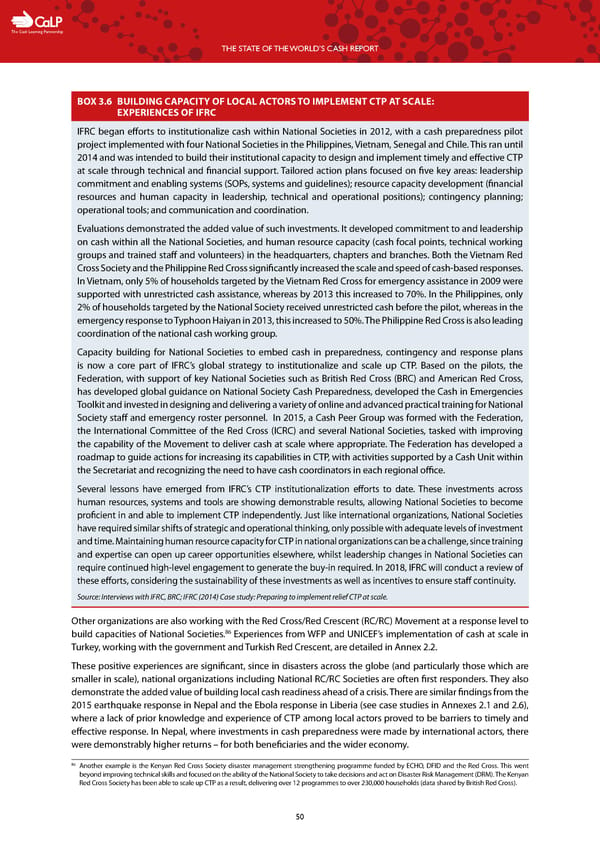C The Cash Learning Partnership THE STATE OF THE WORLD’S CASH REPORT BOX 3.6 BUILDING CAPACITY OF LOCAL ACTORS TO IMPLEMENT CTP AT SCALE: EXPERIENCES OF IFRC IFRC began efforts to institutionalize cash within National Societies in 2012, with a cash preparedness pilot project implemented with four National Societies in the Philippines, Vietnam, Senegal and Chile. This ran until 2014 and was intended to build their institutional capacity to design and implement timely and effective CTP at scale through technical and financial support. Tailored action plans focused on five key areas: leadership commitment and enabling systems (SOPs, systems and guidelines); resource capacity development (financial resources and human capacity in leadership, technical and operational positions); contingency planning; operational tools; and communication and coordination. Evaluations demonstrated the added value of such investments. It developed commitment to and leadership on cash within all the National Societies, and human resource capacity (cash focal points, technical working groups and trained staff and volunteers) in the headquarters, chapters and branches. Both the Vietnam Red Cross Society and the Philippine Red Cross significantly increased the scale and speed of cash-based responses. In Vietnam, only 5% of households targeted by the Vietnam Red Cross for emergency assistance in 2009 were supported with unrestricted cash assistance, whereas by 2013 this increased to 70%. In the Philippines, only 2% of households targeted by the National Society received unrestricted cash before the pilot, whereas in the emergency response to Typhoon Haiyan in 2013, this increased to 50%. The Philippine Red Cross is also leading coordination of the national cash working group. Capacity building for National Societies to embed cash in preparedness, contingency and response plans is now a core part of IFRC’s global strategy to institutionalize and scale up CTP. Based on the pilots, the Federation, with support of key National Societies such as British Red Cross (BRC) and American Red Cross, has developed global guidance on National Society Cash Preparedness, developed the Cash in Emergencies Toolkit and invested in designing and delivering a variety of online and advanced practical training for National Society staff and emergency roster personnel. In 2015, a Cash Peer Group was formed with the Federation, the International Committee of the Red Cross (ICRC) and several National Societies, tasked with improving the capability of the Movement to deliver cash at scale where appropriate. The Federation has developed a roadmap to guide actions for increasing its capabilities in CTP, with activities supported by a Cash Unit within the Secretariat and recognizing the need to have cash coordinators in each regional office. Several lessons have emerged from IFRC’s CTP institutionalization efforts to date. These investments across human resources, systems and tools are showing demonstrable results, allowing National Societies to become proficient in and able to implement CTP independently. Just like international organizations, National Societies have required similar shifts of strategic and operational thinking, only possible with adequate levels of investment and time. Maintaining human resource capacity for CTP in national organizations can be a challenge, since training and expertise can open up career opportunities elsewhere, whilst leadership changes in National Societies can require continued high-level engagement to generate the buy-in required. In 2018, IFRC will conduct a review of these efforts, considering the sustainability of these investments as well as incentives to ensure staff continuity. Source: Interviews with IFRC, BRC; IFRC (2014) Case study: Preparing to implement relief CTP at scale. Other organizations are also working with the Red Cross/Red Crescent (RC/RC) Movement at a response level to 86 build capacities of National Societies. Experiences from WFP and UNICEF’s implementation of cash at scale in Turkey, working with the government and Turkish Red Crescent, are detailed in Annex 2.2. These positive experiences are significant, since in disasters across the globe (and particularly those which are smaller in scale), national organizations including National RC/RC Societies are often first responders. They also demonstrate the added value of building local cash readiness ahead of a crisis. There are similar findings from the 2015 earthquake response in Nepal and the Ebola response in Liberia (see case studies in Annexes 2.1 and 2.6), where a lack of prior knowledge and experience of CTP among local actors proved to be barriers to timely and effective response. In Nepal, where investments in cash preparedness were made by international actors, there were demonstrably higher returns – for both beneficiaries and the wider economy. 86 Another example is the Kenyan Red Cross Society disaster management strengthening programme funded by ECHO, DFID and the Red Cross. This went beyond improving technical skills and focused on the ability of the National Society to take decisions and act on Disaster Risk Management (DRM). The Kenyan Red Cross Society has been able to scale up CTP as a result, delivering over 12 programmes to over 230,000 households (data shared by British Red Cross). 50
 The State of the World's Cash | Full Report Page 51 Page 53
The State of the World's Cash | Full Report Page 51 Page 53